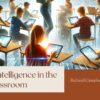Introduction
Greetings to each and every one of you who has chosen to join me on this intellectual journey today. If you’re here, it’s likely because you share my passion for the transformative power of education. Specifically, we’re delving into a topic that has the potential to redefine our educational systems: AI for Student Progress Tracking.

Now, you may be asking, “Why focus on AI for tracking student progress?” The answer is simple yet profound. As educators, researchers, and parents, we all strive for one thing: the betterment of our students’ learning experiences. And in this digital age, AI is no longer just a buzzword; it’s a tool that can offer us invaluable insights into student performance, engagement, and learning paths.
So, you’re in the right place if the idea of using technology to make data-driven decisions in education intrigues you.
👉 Call to Action: Stick with me as we explore how AI is not just a trend but a game-changing tool in educational technology. Shall we begin?
The Current State of AI for Student Progress Tracking
If you’re like me, you’ve probably noticed that the term “AI” is everywhere these days, from healthcare to finance. But what about its role in education? Specifically, how is AI shaping the way we track student progress? Well, let me tell you, it’s not just a passing fad; it’s a transformative force that’s here to stay.
According to a report by Interesting Engineering, AI in education is expected to reach a market value of $6 billion by 2025. That’s not pocket change! This surge in investment indicates a growing recognition of the value AI brings to educational settings, particularly in tracking student progress.

But why is this important? Tracking student progress isn’t just about grades; it’s about understanding the nuances of each student’s learning journey. AI allows us to collect and analyze data in real-time, offering insights that can inform teaching methods, tailor learning plans, and ultimately improve student outcomes.
📌 Takeaway: AI is not just revolutionizing industries; it’s making a significant impact in the realm of education, particularly in tracking student progress. As educators and stakeholders, it’s crucial for us to understand and leverage this technology for the betterment of our educational systems.
The Impact of AI on Student Engagement
Let’s get into the nitty-gritty, shall we? One of the most exciting applications of AI in education is its ability to enhance student engagement. Now, I know what you’re thinking: “Engagement? Isn’t that a bit subjective?” You’re absolutely right, but that’s where AI comes in to offer some clarity.
A study published in the Springer Open Journal explores how AI-powered learning platforms can significantly improve student motivation and engagement. These platforms use algorithms to adapt to each student’s learning style, making the educational experience more interactive and personalized.
Imagine a classroom where the curriculum dynamically adjusts to keep students interested, or an online course that provides real-time feedback to keep learners on track. That’s not science fiction; it’s the reality we’re moving towards, thanks to AI.

📌 Takeaway: AI has the potential to revolutionize student engagement by offering personalized, interactive learning experiences. It’s not just about keeping students’ eyes glued to the screen; it’s about igniting their passion for learning.
Personalized Learning Through AI: Advanced Applications
But let’s not stop there. The potential applications of AI in personalized learning go beyond just tailoring educational materials. Advanced AI systems can also offer real-time adjustments to the curriculum based on a student’s performance, engagement level, and even emotional state.
For example, some AI platforms can detect when a student is losing interest or struggling with a particular topic. The system can then dynamically adjust the lesson plan, perhaps introducing an interactive game or a short quiz to re-engage the student.

This level of personalization could be particularly beneficial in special education settings, where students often have very specific and varied learning needs. AI can help educators design more effective and inclusive learning environments for all students, regardless of their learning challenges.
📌 Takeaway: The advanced applications of AI in personalized learning are not just promising; they’re revolutionary. As educators, researchers, or parents, understanding and harnessing this technology can significantly improve educational outcomes for all students.
Interactive Learning: A New Frontier in AI Applications
As we venture deeper into the transformative potential of AI, it’s impossible to overlook its impact on interactive learning. If you’re like me, you’ve probably noticed that traditional lecture-based teaching methods are increasingly giving way to more interactive, hands-on approaches. And guess what? AI is right at the forefront of this shift.
A study in the Springer Open Journal highlights how AI can facilitate immersive learning experiences through simulations, gamification, and even virtual reality. These aren’t just flashy tech gimmicks; they’re proven methods to enhance learning outcomes.

Imagine a history lesson where students can virtually visit ancient civilizations or a science class where they can conduct experiments in a simulated lab environment. This level of interactivity can significantly boost student engagement and make learning more enjoyable.
📌 Takeaway: AI is opening new frontiers in interactive learning, offering students a more engaging and experiential educational journey.
AI-Powered Assessment Tools: The Benefits Unveiled
As we continue to explore the transformative potential of AI in education, it’s crucial to delve into the specific benefits of AI-powered assessment tools. These tools are not just a modern convenience; they’re a paradigm shift in how we approach assessments in educational settings.
In an insightful article by Times Higher Education, the author states, “AI-driven assessment tools can provide a more nuanced understanding of student performance, going beyond mere grades to offer insights into learning behaviors and skill development.” This quote encapsulates the essence of why AI-powered assessments are so groundbreaking.

Key Benefits of AI-Powered Assessment Tools:
- Real-Time Feedback: Immediate insights allow both teachers and students to make timely adjustments to their teaching and learning strategies.
- Automated Grading: Saves time for educators, allowing them to focus more on interactive teaching rather than administrative tasks.
- Student Progress Tracking: Continuous data collection provides a comprehensive view of each student’s academic journey.
- Adaptive Assessments: The difficulty level adjusts in real-time based on student performance, ensuring an appropriate level of challenge.
- Personalized Learning Analytics: Detailed reports can be generated to identify areas for improvement, tailored to each student’s needs.
📌 Takeaway: AI-powered assessment tools offer a multifaceted approach to student evaluation, providing real-time feedback, automated grading, and personalized analytics that can significantly enhance the educational experience for both teachers and students.
AI for Teacher Support: An Untapped Resource
As we navigate the intricate landscape of AI in education, it’s essential to recognize that students aren’t the only beneficiaries. Teachers, the unsung heroes of education, stand to gain immensely from AI advancements. From simplifying administrative tasks to enhancing professional development, AI is poised to be an invaluable ally for educators.

An article in Language Magazine aptly notes, “AI can significantly reduce the administrative burden on teachers, allowing them more time to focus on what they do best: teaching.” This statement hits the nail on the head, encapsulating the transformative potential of AI for teacher support.
How AI Supports Teachers:
- Instructional Tools: AI can curate and recommend teaching materials based on the current curriculum, student performance, and even upcoming educational trends.
- Administrative Tasks Automation: From grading to attendance tracking, AI can handle a range of administrative tasks, freeing up teachers to focus on more meaningful interactions with students.
- Teacher Professional Development: AI-driven analytics can identify areas where teachers might benefit from additional training or resources.
- AI-Driven Tutoring: AI can assist in providing targeted tutoring sessions, allowing teachers to offer more personalized support to students.
- Educational Resources: AI can help in the efficient organization and retrieval of educational resources, making lesson planning more streamlined.
📌 Takeaway: AI is not just a tool for enhancing student learning; it’s a robust support system for teachers as well. By automating administrative tasks and offering intelligent instructional tools, AI empowers teachers to do what they do best: educate.
Conclusion: The Future is Bright with AI for Student Progress Tracking
As we wrap up this enlightening journey through the world of AI in education, it’s clear that we’re standing on the brink of a transformative era. From enhancing student engagement and offering personalized learning experiences to revolutionizing assessments and supporting teachers, the applications of AI are both vast and profound.
The future potential of AI for student progress tracking is particularly exciting. Imagine a world where educators can make data-driven decisions in real-time, where students are consistently engaged because the learning environment adapts to their needs, and where teachers are empowered with tools that allow them to focus on what they do best: teaching.
📌 Takeaway: The integration of AI into our educational systems is not just an upgrade; it’s a paradigm shift. As we look to the future, the potential for AI to enhance every facet of education is limitless.
👉 Call to Action: What are your thoughts on the role of AI in education? Are you excited about the endless possibilities, or do you have reservations? Either way, your insights are valuable. Share your thoughts and let’s continue this important conversation!
Additional Resources for Further Reading
If you’re as captivated by the potential of AI in education as I am, you’ll likely want to dive deeper into this fascinating subject. Below are some additional resources that can offer further insights:
- 43 AI Tools for Teachers: A Comprehensive Guide to Integrating Technology in the Classroom – My own comprehensive guide that explores various AI tools designed to assist teachers in the classroom.
- Interesting Engineering: How AI is Improving Education – A detailed look at the market value and growth of AI in education.
- Springer Open Journal: AI and Student Engagement – A scholarly article that delves into how AI can improve student motivation and engagement.
- Times Higher Education: The Potential of AI in Assessment – An article that discusses the nuanced benefits of AI-powered assessment tools.
- Language Magazine: The Importance of AI in Education – A piece that highlights how AI can assist teachers and benefit students with diverse learning needs.
Frequently Asked Questions (FAQs) About AI for Student Progress Tracking
What is AI for Student Progress Tracking?
AI for Student Progress Tracking refers to the use of Artificial Intelligence algorithms and tools to monitor, analyze, and report on a student’s academic performance in real-time. These systems can adapt to individual learning styles and needs, providing personalized feedback and recommendations for improvement.
How Does AI for Student Progress Tracking Enhance Student Engagement?
AI systems can dynamically adjust the curriculum based on a student’s engagement level and performance. For example, if a student is losing interest in a subject, the AI can introduce interactive elements like games or quizzes to re-engage the student. This leads to a more personalized and engaging learning experience.
Can AI-Powered Assessment Tools Replace Traditional Grading Methods?
While AI-powered assessment tools offer real-time feedback and automated grading, they are not meant to completely replace traditional grading methods. Instead, they serve as a complementary tool that can make the assessment process more efficient and nuanced, providing insights beyond mere grades.
How Can Teachers Benefit from AI in Education?
AI can significantly reduce the administrative burden on teachers by automating tasks like grading and attendance tracking. It can also offer intelligent instructional tools and analytics for professional development, allowing teachers to focus more on teaching and less on administrative tasks.
Is AI for Student Progress Tracking Suitable for All Age Groups?
Yes, AI for Student Progress Tracking is versatile and can be adapted for learners of all ages, from elementary school students to adult learners. The key is to choose the right AI tools and platforms that are age-appropriate and aligned with the educational goals.
What Are the Ethical Considerations in Using AI for Student Progress Tracking?
While AI offers numerous benefits, it’s essential to consider data privacy and ethical use of student information. Ensuring that the AI systems are compliant with educational data protection regulations is crucial for ethical implementation.








Recent Comments